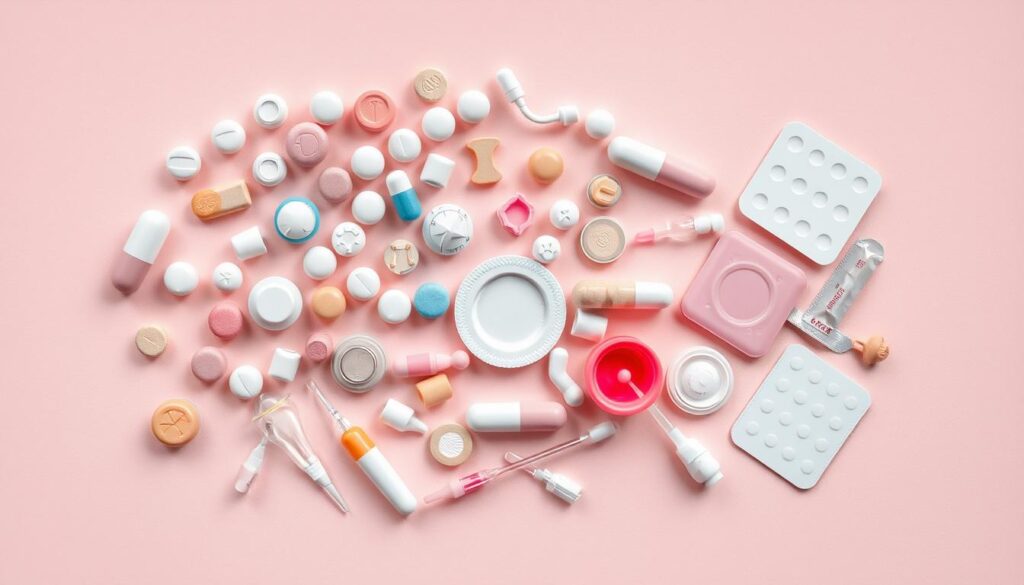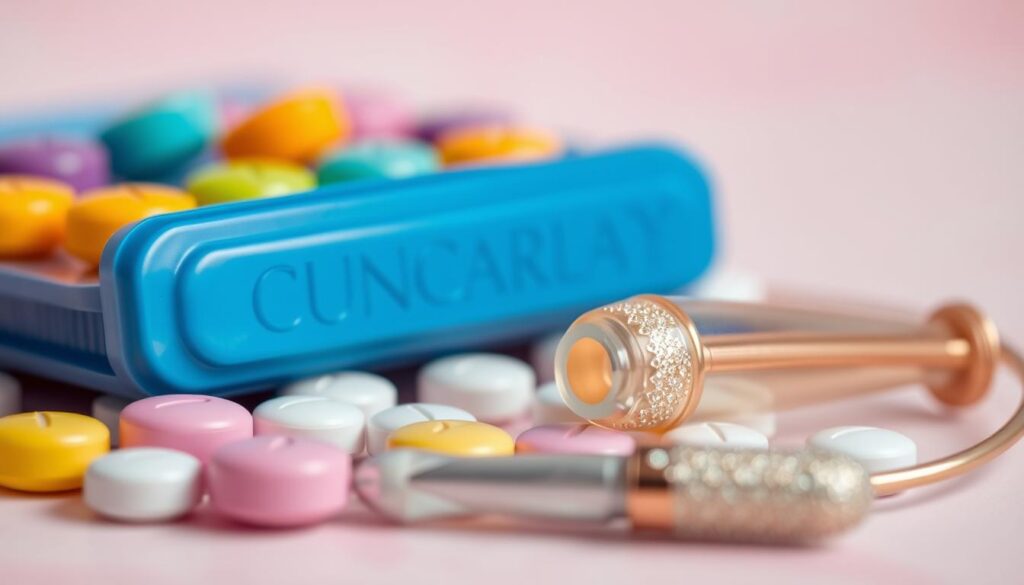Using hormonal birth control can change how you feel about sex. Many people on the pill or ring say they want sex less. It’s good to know why this happens.
Birth control pills can change your testosterone levels. This hormone is key for wanting sex. Less testosterone means you might not feel like having sex as much.
But, how birth control affects your libido varies. Stress, how you see yourself, and your relationship can also play a big part. Some women even say they want sex more on birth control. They feel healthier and worry less about getting pregnant.
Key Takeaways:
- Hormonal birth control can impact sex drive by affecting testosterone levels
- Other factors like stress, body image, and relationship dynamics also influence sexual desire
- Some women report increased libido on birth control due to feeling healthier or freer
- Significant changes in sexual desire should be discussed with a healthcare provider
- Lifestyle adjustments like diet and exercise may help boost sex drive
Understanding the Connection Between Birth Control and Libido
Hormonal contraceptives and sex drive have a complex story. Birth control pills, patches, and rings can change a woman’s libido. Some women see no change, while others feel more or less desire for sex.
How Hormonal Contraceptives Affect Your Body
Combined hormonal contraceptives have estrogen and progesterone. They stop ovulation and make cervical mucus thicker. This can change a woman’s hormones and affect her sex drive. Lower estrogen doses in some pills might change sexual functioning more.
The Role of Testosterone in Female Sex Drive
Testosterone is key for female sex desire, but it’s complex. Birth control can change free testosterone levels, affecting libido. But, a woman’s body, mind, and society also play big roles in her sex drive.
Individual Variations in Response to Birth Control
How birth control affects libido varies a lot between women. What works for one might not work for another. It’s important to watch how your body reacts to different birth controls and talk to your doctor about any issues.
“Understanding the individual nature of how birth control affects sex drive is key to finding the right solution.”
Common Signs of Low Sex Drive Birth Control Effects
Hormonal birth control like the pill can stop pregnancy but might lower your sexual desire. Many women say they feel less sexy when on hormonal birth control. These birth control side effects can show up in different ways.
One common sign is feeling less excited about sex. Some women don’t get as turned on as they used to. They might also have less natural wetness, making sex uncomfortable or painful.
A 2016 study showed women on hormonal birth control felt less sexy and aroused. But, they had the same number of good sex times and orgasms as those not on birth control.
How birth control affects libido varies for everyone. Some women don’t notice a change, while others feel a big drop in desire. Your hormones, health, and what you like can influence how it affects you.
“Hormonal contraceptives can decrease the production of androgen hormones, leading to diminished sexual desire in women.”
If you feel less sexy since starting a new birth control, talk to your doctor. They can help find a better fit for you. This might include options that don’t affect your libido changes as much.
The Science Behind Hormonal Contraception and Sexual Desire
Hormonal birth control affects your hormones, leading to changes. These changes can impact your sex drive.
Impact on Hormone Levels
Hormonal contraceptives, especially those with progestin, change your testosterone levels. Testosterone is important for women’s sexual desire. Studies show that up to 43% of women on hormonal birth control feel less sexual desire.
The type and amount of hormones in the contraceptive matter. Some contraceptives lower free testosterone, affecting sexual function.
Physical and Emotional Changes
Hormonal birth control can cause vaginal dryness and breast tenderness. These changes can make sex uncomfortable. It can also make you feel more anxious, depressed, and stressed, which can lower your desire for sex.
Duration of Side Effects
The time it takes for hormonal birth control to affect sex can vary. Some notice changes right away, while others take longer. The type of contraceptive used also matters. Some, like the hormonal IUD or patch, might have less effect on libido than others.
The relationship between hormonal birth control and sex drive is complex. It’s different for everyone. Keeping track of your feelings and talking to your doctor can help find the right birth control for you.
Different Types of Birth Control Methods and Their Impact on Libido
Birth control comes in many forms, each affecting libido differently. Knowing how each type might change your sex drive can help you choose wisely.
Oral contraceptives, vaginal rings, and hormonal patches mix hormones. Most women say they don’t change their sex life or even make it better. The vaginal ring might make your vagina wetter than oral pills.
Progestin-only birth control, like the mini-pill and injectables, has less research on libido. But, some studies say the vaginal ring might make you more interested in sex than pills.
| Birth Control Method | Potential Impact on Libido |
|---|---|
| Oral Contraceptives | Mixed effects, often no change or improved sexual function |
| Vaginal Ring | May increase vaginal wetness and sexual interest compared to pills |
| Hormonal Patch | Mixed effects, often no change or improved sexual function |
| Progestin-only Methods (mini-pill, injectable) | Limited research, but some studies suggest higher sexual interest with vaginal ring |
The effect of birth control on libido varies a lot. It’s key to talk to your doctor to find the right method for you.

Natural Ways to Boost Your Sex Drive While on Birth Control
If you’re feeling less interested in sex while on birth control, don’t worry. There are natural ways to boost your sex drive. You can try different foods, change your lifestyle, and exercise more. These strategies can help you feel more sparky again.
Dietary Recommendations
Eat foods that help your sex drive. Eat more plant-based proteins, lean meats, and foods rich in zinc like almonds and pumpkin seeds. Avoid foods high in saturated fats and sugar, as they can harm your sex health. Dark chocolate, with at least 70% cocoa, might also help.
Lifestyle Changes
Managing stress and feeling good about your body can help your sex drive. Try activities like meditation, yoga, or just taking time for yourself. Talking openly with your partner about sex can also make things better.
Exercise and Physical Activity
Exercise can really help your libido. It boosts your energy and improves your sex health. Find something fun like walking, dancing, or lifting weights. Make it a regular part of your life.
Everyone’s body and needs are different. By trying these natural ways, you can keep your sex life healthy and happy while on birth control.
When to Consider Switching Birth Control Methods
If birth control is hurting your sex drive, it’s time to think about changing. You have many other options to choose from. Talking to your doctor can help you find the right one for you.
Some women might do better with a different pill. Maybe one with more estrogen or a different progestin. Others might like a non-hormonal choice, like a copper IUD or barrier methods.
“Approximately one in five OCP users report negative sexual side effects, and at least half of them discontinue their method due to these concerns.”
Think about how important pregnancy prevention is to you. Your doctor can help you decide what’s best for you. They’ll look at the research and your lifestyle.
Everyone’s body reacts differently to birth control. Be patient and work with your doctor. You can find a balance between safe birth control and feeling good about sex.
Non-Hormonal Birth Control Alternatives
If hormonal birth control side effects bother you, or if you don’t want synthetic hormones, there are other choices. You can try copper IUDs, barrier methods like condoms and diaphragms, or natural family planning.
IUD Options
Copper IUDs are over 99% effective against pregnancy. They’re a great non-hormonal option. Copper IUDs make the uterus not good for sperm, without changing your hormones.
Barrier Methods
Barrier methods, like condoms and diaphragms, block sperm. Male condoms are 98% effective with perfect use. Female condoms are 95% effective. Diaphragms, with spermicide, can be up to 84% effective.
Natural Family Planning
Natural family planning tracks your cycle and fertility signs. It helps you know when you can or can’t get pregnant. Used right, it can be up to 95% effective.
Every non-hormonal birth control has its own points to think about. Talk to your doctor to find the best one for you. This way, you can pick a method that fits your life and health goals.
The Role of Mental Health and Relationships
Your mental health and relationships are key to your sex life. Stress, anxiety, and depression can hurt your desire for sex. Also, not talking enough or having fights can make sex harder.
How you feel about your body matters too. If you don’t like how you look, it can make sex less fun. Fixing these mental and relationship issues is important when you don’t want sex as much.
Going to couples therapy or talking to a counselor can help. A therapist can work with you and your partner. They can help solve emotional and relationship problems that affect your sex life.
| Factors Affecting Sexual Well-Being | Potential Impacts |
|---|---|
| Stress, Anxiety, and Depression | Negatively impact libido and sexual desire |
| Relationship Issues | Lack of communication, unresolved conflicts can affect sexual desire |
| Body Image Concerns | Interfere with sexual confidence and enjoyment |
It’s as important to deal with psychological factors and relationship dynamics as physical or hormonal issues. With the right help, you can get past these problems. This way, you can find your sex drive again.

“Improving your mental health and nurturing your relationships can have a profound impact on your sexual desire and function.”
Working with Your Healthcare Provider
Talking openly with your healthcare provider is very important. If you notice changes in your libido or sexual function, tell them. They can figure out if it’s because of the birth control or something else.
Your healthcare provider can give you great advice. They might suggest different birth control, change the dosage, or recommend other treatments. It’s important to talk about your sexual health regularly to stay healthy.
Using apps like Clue can help you track your symptoms and activities. This information can help your provider understand your situation better. It makes your medical consultations more personal and helpful.
“It’s common for individuals to experience difficulties in discussing sex and libido changes, but healthcare providers are well-versed in addressing such concerns.”
Your provider wants to help you find the right birth control. They want it to fit your needs and preferences. Don’t be shy about sharing your concerns. Work together to find the best solution for your sexual and reproductive health.
| Key Considerations | Potential Solutions |
|---|---|
| Decreased libido or sexual function |
|
| Difficulty discussing sexual health |
|
| Comprehensive sexual health assessment |
|
Conclusion
Birth control can affect your sex drive differently for everyone. Some people might feel less interested in sex. Others might not notice a change or might even feel more interested.
It’s important to know how different birth control methods work. Think about your lifestyle and talk to your doctor. This helps you make the best choices for you.
Your sex life is about more than just physical stuff. It’s also about how you feel and your relationships. By talking to your doctor and making smart choices, you can keep your sex life good while using birth control.
Don’t think there’s just one way birth control affects everyone. By learning and taking care of your health, you can find what works best for you. This way, you can live a happy and balanced life.


A Life-Changing Experience with This Weight Loss Supplement (Nagano Tonic)
I’ve always struggled with finding a weight loss solution that actually works for me. Like many, I’ve tried numerous diets, exercise routines, and supplements over the years—some worked for a short time, but nothing ever gave me long-term results. That was until I decided to try the weight loss supplement I found : link to the supplement.
What makes this supplement stand out from all the others I’ve tried is how it supports me in my daily routine without any jitters or energy crashes. I’m able to stay focused and motivated, which has made it easier to stay on track with my diet and exercise plan.
This product truly exceeded my expectations, and I feel more confident and healthier than ever before. If you’re struggling with your weight loss journey like I was, I highly recommend giving this supplement a try. It’s been a game-changer for me, and I’m sure it can work wonders for you too!
Contant Them on email .. tonicnagano50@gmail.com
I’ve tried so many weight loss products over the years, but nothing worked like this supplement! Since I started using it, I’ve noticed a big difference in my energy levels and appetite control. In just a few weeks, I’ve lost weight and feel so much better. It’s been easy to stick with, and the results speak for themselves. Highly recommend this to anyone looking to make a real change!
wasn’t sure what to expect, but this weight loss supplement has really impressed me! After just a few weeks of use, I’ve already dropped a few pounds and feel more motivated to stay active. It’s helped curb my cravings and boosted my energy throughout the day. I’m excited to keep going and see even better results. Definitely worth trying!
Reach them on tonicnagano50@gmail.com
I was skeptical at first, but this supplement has truly made a difference in my weight loss journey. I’ve lost weight without feeling deprived or sluggish. My cravings are under control, and I feel more confident in my body. It’s easy to incorporate into my daily routine, and the results speak for themselves. I’m so glad I gave it a try!
Thanks David, i do use the link to make my purchase. you can get too here http://surl.li/iasppy
I’ve tried so many weight loss products, but this one has been by far the most effective. In just a few weeks, I’ve noticed a visible difference in my body and energy levels. It’s helped me stay on track without the constant hunger pangs and cravings. I’m really happy with my progress and can’t wait to see where I’ll be in another month!
This Nagano Tonic has been amazing! In just a few weeks, I’ve lost weight, feel more energized, and my cravings are under control. Highly recommend it!
Thats the link to purchase http://surl.li/iasppy